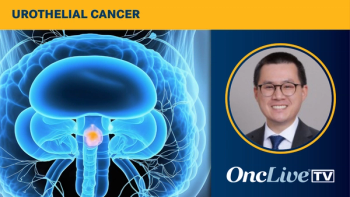
Current Status of Therapy: Metastatic Urothelial Cancer
Shilpa Gupta, MD: We’ve seen tremendous progress in treating metastatic urothelial cancer patients over the last few years. Currently, the standard is that the first-line treatment for metastatic or advanced urothelial cancer patients remains platinum-based chemotherapy, either with gemcitabine and cisplatin or gemcitabine and carboplatin. For patients who are cisplatin-ineligible, we have the option to use immunotherapy if they have high PD-L1 levels in their tumor or carboplatin if they do not have high PD-L1 expression.
For patients who are not eligible for carboplatin, immunotherapy can be used as first-line. Chemotherapy remains a backbone in the first-line setting. As far as subsequent line settings go, we see remarkable progress. Immunotherapy is approved for patients who progress after platinum use. We have new drug approvals like enfortumab vedotin, which was approved last year, as well as the FGFR3 inhibitor erdafitinib for patients with qualifying mutations in FGFR. We are making a lot of progress in how we treat advance urothelial cancer patients.
Jeanny Aragon-Ching, MD: Unfortunately, no screening tests are recommended for people with average risk of bladder cancer. Of course, we’re all aware of patients coming for medical attention because of hematuria. That’s 1 of the most common manifestations for patients. That leads to further work-up and diagnosis in terms of cystoscopy. They undergo TURBT (trans urethral resection of bladder tumor); certain urinary tumor markers have also been used beyond cytology.
In terms of risk factors, for bladder cancer in general, it includes things like smoking and workplace exposure in industries that carry high risk of bladder cancer, including folks who work in the industries of rubber, leather, textiles, paint products, and certain herbals or drugs. Medicines used for diabetes have been linked to bladder cancer and other chemicals, like arsenic in water.
Shilpa Gupta, MD: Currently, we are not using genetic and molecular characteristics to guide treatment decisions, but it’s a very important area of research. In the neoadjuvant setting, the molecular subtyping has shown that patients may respond differently to neoadjuvant chemotherapy, depending on the molecular subtype. However, it is not a standard-of-care approach. This is what we are actively studying as a part of our Department of Defense grant. In the future, we hope to have comprehensive genetic and molecular biomarkers to guide therapy, besides using PD-L1 expression.
Jeanny Aragon-Ching, MD: PD-L1 expression in metastatic urothelial cancer can be answered and determined by varying ways. Currently in the field, PD-L1 testing is unfortunately not uniformly defined in urothelial cancers, so there are a lot of assays and platforms that are being used. It really varies on what tests you use, what study you’re looking at, and whether you’re looking at the tumor cell or the immune cell.
There are differences in the quantification thresholds for PD-L1 expression. In general, tumor cell, or tumor-infiltrating immune cell, positivity in the primary tumor ranges from 32% to 66%. It varies between studies and assays that have been used.
Transcript Edited for Clarity






































